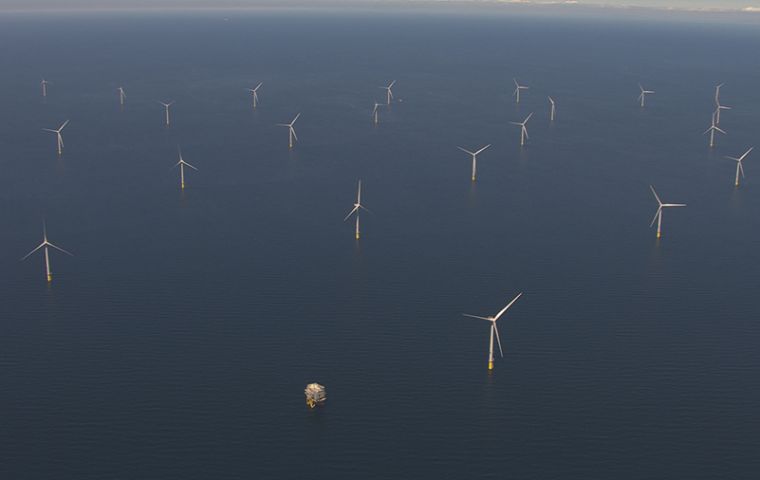MercoPress. South Atlantic News Agency
UK and industry plan 30% of electricity from offshore wind farms by 2030
 The government commitment is for offshore wind to produce 30 gigawatts (GW) by 2030, creating thousands of so-called “green collar” jobs in the process
The government commitment is for offshore wind to produce 30 gigawatts (GW) by 2030, creating thousands of so-called “green collar” jobs in the process A deal confirmed between the UK government and the wind industry will ensure 30% of electricity comes from offshore wind by 2030. The move will help the UK towards the aim of securing almost all its power from low-carbon sources by 2030.
It is the latest in a series of agreements with sectors of the economy that are likely to create jobs. But environmentalists are wondering where the other 70% of the UK’s clean electricity will come from. That is because, for several years, government economists have foreseen a three-pronged energy policy by 2030.
Civil servants have projected that 30% of electricity would come from offshore wind, 30% from nuclear and 30% from gas power stations fitted with technology to capture their carbon emissions and bury them.
But here is the reality - it is now confirmed that wind will fulfill its part by 2030. However plans to expand nuclear are foundering; indeed the UK may end up at worst with just one new nuclear station - at Hinkley - instead of the planned six.
As for gas with carbon capture, there is only a single such power plant planned at commercial scale. And that is stuck in the proposal stage.
The government promises it will meet pledges to keep the lights on and cut emissions.
Its commitment is for offshore wind to produce 30 gigawatts (GW) by 2030, creating thousands of so-called “green collar” jobs in the process. Young people are especially attracted to jobs in the environment sector.
But green groups believe much more is needed – probably half as much again (45GW).
John Sauven, executive director of Greenpeace UK, said: ”Now the government's plans for a fleet of new nuclear reactors has collapsed, it leaves Britain with a big energy gap in future.
“It means the latest offshore wind target of 30GW by 2030 is woefully inadequate.
“Wind and solar must be tripled between now and 2030, with offshore wind the future backbone of the UK's energy system.”
Rachel Reeves, chair of the Commons business, energy and industrial strategy (BEIS) committee said: ”Investment decisions over nuclear plants such as Moorside and Wylfa have left the UK facing a giant hole in its energy policy.
“Given that dirty coal is due to go off-line, and the prospects for nuclear looking uncertain, it’s vital the government comes forward with a Plan B to plug the energy gap.”




Top Comments
Disclaimer & comment rulesCommenting for this story is now closed.
If you have a Facebook account, become a fan and comment on our Facebook Page!